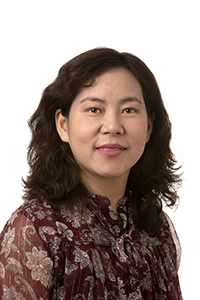HSC researcher receives $1.8 million grant for work on technology to enhance oral absorption of water-insoluble drugs
 Xiaowei Dong, Associate Professor and P1 Curriculum Director at HSC College of Pharmacy, was recently awarded the Maximizing Investigators’ Resource Award (MIRA-R35) to continue her research into technologies that improve the effectiveness of oral drugs.
Xiaowei Dong, Associate Professor and P1 Curriculum Director at HSC College of Pharmacy, was recently awarded the Maximizing Investigators’ Resource Award (MIRA-R35) to continue her research into technologies that improve the effectiveness of oral drugs.
Dr. Dong received the five-year, $1.8 million award from National Institutes of General Medical Sciences at the National Institutes of Health.
An estimated 40% of approved drugs and nearly 90% of the developmental pipeline drugs consist of poorly water-soluble molecules, Dr. Dong said. Oral administration is the most favorable and preferred route.
Previously, Dr. Dong worked as a lead formulator in drug product development at Novartis Pharmaceutical Corporation, where her projects were related to water-insoluble compounds.
“Although there were several oral special delivery systems available for water-insoluble compounds, we still faced limited technology options,” she said. “Without effective drug delivery systems for poorly water-soluble drugs, development of oral formulations of molecules are often abandoned nevertheless having strong therapeutic potentials.
“Moreover, many marketed oral drugs have poor water solubility and are commonly associated with low bioavailability and patient variability.”
As an expert in lipid nanoparticles, Dr. Dong observed their advantages for drug delivery. However, a hurdle in using lipid nanoparticles in oral solid dosage forms was low drug loading, meaning the final solid form would have a small amount of drug after nanoparticles were converted to solid forms.
“When I came back to academia in 2013, I dedicated myself to research in this area. In 2015, I discovered in situ self-assembled nanoparticles (ISNP),” Dr. Dong said.
This award is based on this nanotechnology to advance formulation technology for water-insoluble drugs, she said.
“With this novel nanotechnology, we are able to produce drug solid nanoformulations with high drug loading,” Dr. Dong said. “We found many special features about this nanotechnology.”
Dr. Dong, who earned a PhD in Pharmaceutical Sciences in College of Pharmacy at the University of Kentucky, collaborates with other research efforts.
“The ISNP nanotechnology is the main focus in my lab now,” she said. “(But) because my research is about formulation technology, I can use it for different drugs to treat different diseases. Currently, I collaborate with other researchers on the treatments of lung disease, cancers and diabetes.”
Dr. Dong said research on formulation and drug delivery is creative work.
“We need to customize each formulation according to the properties of one particular drug,” she said. “This research is also very challenging because we have to constantly change compositions, technology and procedures to provide the best formulation for one drug.”


![Uyen Sa Nguyen Scaled[58]](https://www.unthsc.edu/newsroom/wp-content/uploads/sites/16/Uyen-Sa-Nguyen-scaled58-145x175.jpg)


Social media